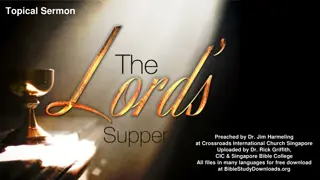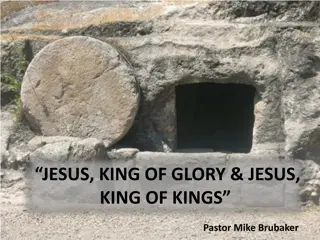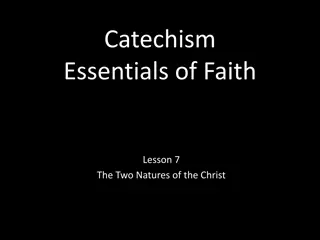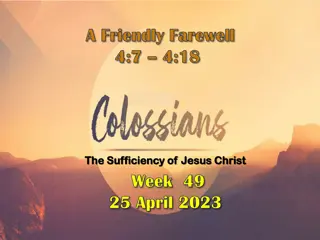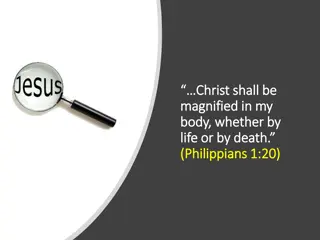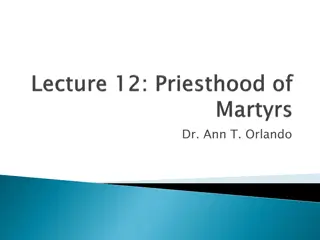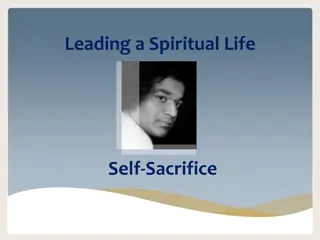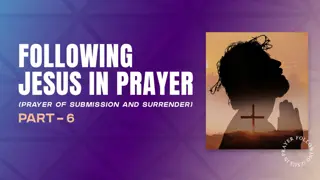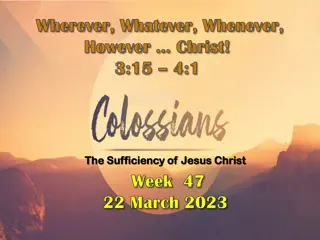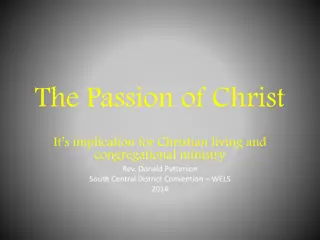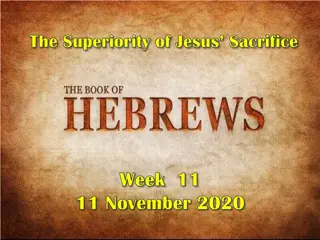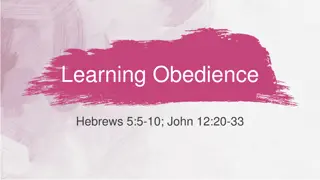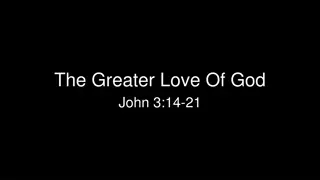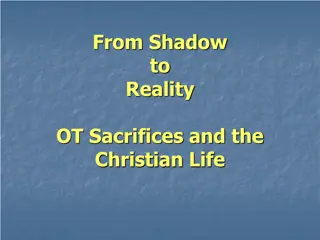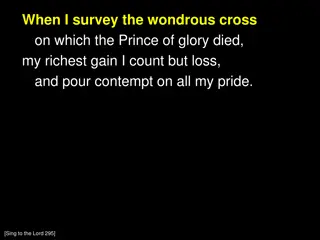The Sufficiency of Christ's Sacrifice in Hebrews: Understanding the Limitations of the Law of Moses
Delve into the depths of Hebrews 9:1-10 to uncover the sufficiency of Christ's sacrifice compared to the limitations of the Law of Moses. Explore forgiveness and mercy under the law, the continuous nature of sacrifices, and the absolute forgiveness brought by Christ's sacrifice. Discover how faith and belief play a crucial role in righteousness apart from works.
Download Presentation

Please find below an Image/Link to download the presentation.
The content on the website is provided AS IS for your information and personal use only. It may not be sold, licensed, or shared on other websites without obtaining consent from the author. Download presentation by click this link. If you encounter any issues during the download, it is possible that the publisher has removed the file from their server.
E N D
Presentation Transcript
The Sufficiency Of Christs Sacrifice Hebrews 9:1-10
The Sufficiency Of Christs Sacrifice What Are The Limitations of the Law of Moses? What Was Its Purpose? How Is Christ s Sacrifice Sufficient?
The Sufficiency Of Christs Sacrifice What Are The Limitations of the Law of Moses? There was forgiveness under the law (Lev 4:20,26,31,35; 5:10,13,16,18) Was that forgiveness because of the Law? Was it through the Law? Was it in spite of the Law?
The Sufficiency Of Christs Sacrifice What Are The Limitations of the Law of Moses? There was mercy under the Law (Num 14:19) The LORD is longsuffering and abundant in mercy, forgiving iniquity and transgression; but He by no means clears the guilty, visiting the iniquity of the fathers on the children to the third and fourth generation. Pardon the iniquity of this people, I pray, according to the greatness of Your mercy, just as You have forgiven this people, from Egypt even until now. (Numbers 14:18 19 NKJV) (Rom 4:5-8 Cf Psa 32:1)
But to him who does not work but believes on Him who justifies the ungodly, his faith is accounted for righteousness, just as David also describes the blessedness of the man to whom God imputes righteousness apart from works: Blessed are those whose lawless deeds are forgiven, And whose sins are covered; Blessed is the man to whom the LORD shall not impute sin. (Romans 4:5 8 NKJV) Blessed is he whose transgression is forgiven, Whose sin is covered. Blessed is the man to whom the LORD does not impute iniquity, And in whose spirit there is no deceit. (Psalm 32:1 2 NKJV)
The Sufficiency Of Christs Sacrifice What Are The Limitations of the Law of Moses? Was that forgiveness absolute? Absolute- not qualified or diminished in any way Were those sacrifices limited in their sufficiency? They could not take away sin (Heb 10:4,11) Because of the one offering them (Lev 4:17, 25, 30, 34; 5:6, 13,16) (Heb 5:2-3; 7:27-28; 9:7) They were continuous (Heb 9:23-25)
The Sufficiency Of Christs Sacrifice What Are The Limitations of the Law of Moses? Where those sacrifices limited in their sufficiency? It was a reminder of sin (Lev 16:30-34 Cf Num 5:11-31) (Heb 10:1-3) The law is only a shadow of the good things that are coming not the realities themselves. For this reason it can never, by the same sacrifices repeated endlessly year after year, make perfect those who draw near to worship. Otherwise, would they not have stopped being offered? For the worshipers would have been cleansed once for all, and would no longer have felt guilty for their sins. But those sacrifices are an annual reminder of sins. (Hebrews 10:1 3 NIV11)
The reference here is to the sacrifices made on the great day of atonement. This occurred once in a year. Of course, as often as a sacrifice was offered, it was an acknowledgment of guilt on the part of those for whom it was made. As these sacrifices continued to be offered every year, they who made the offering were reminded of their guilt and their desert of punishment. All the efficacy which could be pretended to belong to those sacrifices, was that they made expiation for the past year. Their efficacy did not extend into the future, nor did it embrace any but those who were engaged in offering them. These sacrifices, therefore, could not make the atonement which man needed. Albert Barnes
But if we walk in the light as He is in the light, we have fellowship with one another, and the blood of Jesus Christ His Son cleanses us from all sin. If we say that we have no sin, we deceive ourselves, and the truth is not in us. If we confess our sins, He is faithful and just to forgive us our sins and to cleanse us from all unrighteousness. (1 John 1:7 9 NKJV)
The Sufficiency Of Christs Sacrifice What Are The Limitations of the Law of Moses? It did not deal with the conscience (Heb 9:9) conscience- {suneide sis} 1. awareness of information about something 2. the inward faculty of distinguishing right and wrong, moral consciousness 3. attentiveness to obligation (BDAG) Neither the Jew or the Gentile could not be justified by the Law (Rom 2:12-16, 20)
For as many as have sinned without law will also perish without law, and as many as have sinned in the law will be judged by the law (for not the hearers of the law are just in the sight of God, but the doers of the law will be justified; for when Gentiles, who do not have the law, by nature do the things in the law, these, although not having the law, are a law to themselves, who show the work of the law written in their hearts, their conscience also bearing witness, and between themselves their thoughts accusing or else excusing them) in the day when God will judge the secrets of men by Jesus Christ, according to my gospel. (Romans 2:12 16 NKJV)
and having a High Priest over the house of God, let us draw near with a true heart in full assurance of faith, having our hearts sprinkled from an evil conscience and our bodies washed with pure water. Let us hold fast the confession of our hope without wavering, for He who promised is faithful. (Hebrews 10:21 23 NKJV)
Therefore let all the house of Israel know assuredly that God has made this Jesus, whom you crucified, both Lord and Christ. Now when they heard this, they were cut to the heart, and said to Peter and the rest of the apostles, Men and brethren, what shall we do? Then Peter said to them, Repent, and let every one of you be baptized in the name of Jesus Christ for the remission of sins; and you shall receive the gift of the Holy Spirit. For the promise is to you and to your children, and to all who are afar off, as many as the Lord our God will call. (Acts 2:36 39 NKJV)
The Sufficiency Of Christs Sacrifice What Then Is The Purpose Of The Law? To bring us to Christ (Gal 2:16; 3:11, 19-25) knowing that a man is not justified by the works of the law but by faith in Jesus Christ, even we have believed in Christ Jesus, that we might be justified by faith in Christ and not by the works of the law; for by the works of the law no flesh shall be justified. (Galatians 2:16 NKJV) But that no one is justified by the law in the sight of God is evident, for the just shall live by faith. (Galatians 3:11 NKJV) Behold the proud, His soul is not upright in him; But the just shall live by his faith. (Habakkuk 2:4 NKJV)
What purpose then does the law serve? It was added because of transgressions, till the Seed should come to whom the promise was made; and it was appointed through angels by the hand of a mediator. Now a mediator does not mediate for one only, but God is one. Is the law then against the promises of God? Certainly not! For if there had been a law given which could have given life, truly righteousness would have been by the law. But the Scripture has confined all under sin, that the promise by faith in Jesus Christ might be given to those who believe. But before faith came, we were kept under guard by the law, kept for the faith which would afterward be revealed. Therefore the law was our tutor to bring us to Christ, that we might be justified by faith. But after faith has come, we are no longer under a tutor. (Galatians 3:19 25 NKJV)
The Sufficiency Of Christs Sacrifice What Then Is The Purpose Of The Law? To condemn both Jew & Gentile (Rom 3:19-31) Now we know that whatever the law says, it says to those who are under the law, that every mouth may be stopped, and all the world may become guilty before God. Therefore by the deeds of the law no flesh will be justified in His sight, for by the law is the knowledge of sin. (Romans 3:19 20 NKJV)
But now the righteousness of God apart from the law is revealed, being witnessed by the Law and the Prophets, even the righteousness of God, through faith in Jesus Christ, to all and on all who believe. For there is no difference; for all have sinned and fall short of the glory of God, being justified freely by His grace through the redemption that is in Christ Jesus, whom God set forth as a propitiation by His blood, through faith, to demonstrate His righteousness, because in His forbearance God had passed over the sins that were previously committed, to demonstrate at the present time His righteousness, that He might be just and the justifier of the one who has faith in Jesus. (Rom 3:21-25 NKJV)
for the demonstration, I say, of His righteousness at the present time, so that He would be just and the justifier of the one who has faith in Jesus. Where then is boasting? It is excluded. By what kind of law? Of works? No, but by a law of faith. For we maintain that a man is justified by faith apart from works of the Law. Or is God the God of Jews only? Is He not the God of Gentiles also? Yes, of Gentiles also, since indeed God who will justify the circumcised by faith and the uncircumcised through faith is one. Do we then nullify the Law through faith? May it never be! On the contrary, we establish the Law. (Romans 3:26 31 NAS95)
The Sufficiency Of Christs Sacrifice What Then Is The Purpose Of The Law? To give the knowledge of sin (Rom 7:7, 13) What shall we say then? Is the law sin? Certainly not! On the contrary, I would not have known sin except through the law. For I would not have known covetousness unless the law had said, You shall not covet. (Romans 7:7 NKJV) Has then what is good become death to me? Certainly not! But sin, that it might appear sin, was producing death in me through what is good, so that sin through the commandment might become exceedingly sinful. (Romans 7:13 NKJV)
The Sufficiency Of Christs Sacrifice What Then Is The Purpose Of The Law? To bring to complete forgiveness (Ex 30:10; Lev 16:34 Cf Heb 9:7) And Aaron shall make atonement upon its horns once a year with the blood of the sin offering of atonement; once a year he shall make atonement upon it throughout your generations. It is most holy to the LORD. (Exodus 30:10 NKJV) This shall be an everlasting statute for you, to make atonement for the children of Israel, for all their sins, once a year. And he did as the LORD commanded Moses. (Leviticus 16:34 NKJV)
The Sufficiency Of Christs Sacrifice What Then Is The Purpose Of The Law? To bring to complete forgiveness (Ex 30:10; Lev 16:34 Cf Heb 9:7) But into the second part the high priest went alone once a year, not without blood, which he offered for himself and for the people s sins committed in ignorance (Hebrews 9:7 NKJV) the word ignorance in Heb 9:7 can be best understood to mean thoughtless or unintentional Cf (Lev 4:14,23; 5:2) (Josh 9:15; Lk 22:55-62,32-33)
The Sufficiency Of Christs Sacrifice What Then Is The Purpose Of The Law? There were different consequences for unintentional sins committed For the priest (Lev 4:3) For the whole congregation (Lev 4:13-14) For a ruler (Lev 4:22-23) For the common people (Lev 4:27-28) This shows the extent of consequences that can come with each group. The more the responsibility the more the sacrifice
So David said to Nathan, I have sinned against the LORD. And Nathan said to David, The LORD also has put away your sin; you shall not die. However, because by this deed you have given great occasion to the enemies of the LORD to blaspheme, the child also who is born to you shall surely die. (2 Samuel 12:13 14 NKJV)
The Sufficiency Of Christs Sacrifice What Then Is The Purpose Of The Law? To bring to complete forgiveness (Ex 30:10; Lev 16:34 Cf Heb 9:7) Willful or intentional sin intentional But the person who does anything presumptuously, whether he is native-born or a stranger, that one brings reproach on the LORD, and he shall be cut off from among his people. Because he has despised the word of the LORD, and has broken His commandment, that person shall be completely cut off; his guilt shall be upon him. (Numbers 15:30 31 NKJV)
Now the man who acts presumptuously and will not heed the priest who stands to minister there before the LORD your God, or the judge, that man shall die. So you shall put away the evil from Israel. And all the people shall hear and fear, and no longer act presumptuously. (Deuteronomy 17:12 13 NKJV)
For if we sin wilfully after that we have received the knowledge of the truth, there remaineth no more sacrifice for sins, But a certain fearful looking for of judgment and fiery indignation, which shall devour the adversaries. He that despised Moses law died without mercy under two or three witnesses: Of how much sorer punishment, suppose ye, shall he be thought worthy, who hath trodden under foot the Son of God, and hath counted the blood of the covenant, wherewith he was sanctified, an unholy thing, and hath done despite unto the Spirit of grace? (Hebrews 10:26 29 KJV)
The Sufficiency Of Christs Sacrifice Then great multitudes came to Him, having with them the lame, blind, mute, maimed, and many others; and they laid them down at Jesus feet, and He healed them. So the multitude marveled when they saw the mute speaking, the maimed made whole, the lame walking, and the blind seeing; and they glorified the God of Israel. (Matthew 15:30 31 NKJV)


